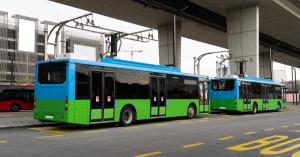
Alfredo Del Mazo Maza Advocates for Inclusion in Urban Mobility
Urban mobility faces one of its greatest challenges in recent decades: how to grow sustainably without leaving behind the most vulnerable sectors of society
NY, UNITED STATES, November 7, 2025 /EINPresswire.com/ -- Urban mobility faces one of its greatest challenges in recent decades: how to grow sustainably without leaving behind the most vulnerable sectors of society.In this context, Alfredo Del Mazo Maza, public policy specialist, has stressed that transportation projects must be built not only on efficiency and technological innovation, but also on social equity.
With a comprehensive vision, Del Mazo Maza has pointed out that international experiences, such as the inclusion of women drivers in electric bus programs in Quito, Peru, or the delivery of electric tricycles to waste pickers in Fortaleza, Brazil, demonstrate that social justice and green solutions can advance together. He also highlighted the use of artificial intelligence to identify underserved communities and plan fairer public transit routes, as well as the importance of expanding active mobility infrastructure with safe bike lanes inspired by the Copenhagen model.
The expert has explained that artificial intelligence has also been used to identify underserved neighborhoods and plan public transportation routes targeting high-need areas, balancing services in peripheral zones and promoting social inclusion. “Technology enabled data-driven decisions, ensuring that more communities have access to efficient and safe mobility,” he added.
Additionally, Del Mazo has highlighted the importance of expanding infrastructure for active mobility, such as safe bike lanes modeled after Copenhagen—a strategy that international studies have linked to lower emissions and improved public health. According to data from the World Health Organization (WHO, 2023), cities that have strengthened active mobility have reported up to a 15% reduction in urban emissions and significant increases in physical activity among residents.
The Mexican politician and mobility expert has concluded that integrating equity, sustainability, and data-driven planning is essential to building inclusive and efficient urban transportation in Mexico. “By applying these experiences and best practices, urban infrastructure was strengthened, and a mobility model that benefits all citizens was promoted,” he said.
Through these efforts, Mexico has been moving toward a fairer, more sustainable, and more accessible transportation system, reinforcing a vision of urban mobility centered on people and social equity.
Miguel A Lopez Aguilar
Marcela Aguilar
+52 55 2922 7338
email us here
Distribution channels: Automotive Industry, Environment, Human Rights, Politics, World & Regional
Legal Disclaimer:
EIN Presswire provides this news content "as is" without warranty of any kind. We do not accept any responsibility or liability for the accuracy, content, images, videos, licenses, completeness, legality, or reliability of the information contained in this article. If you have any complaints or copyright issues related to this article, kindly contact the author above.
Submit your press release
